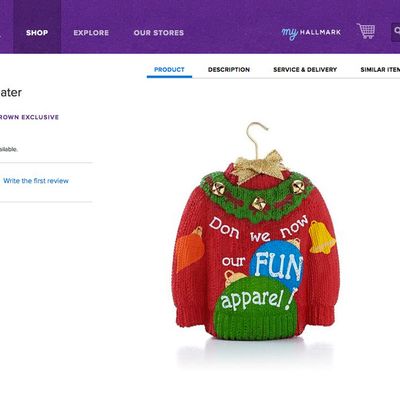
Hallmark is apologizing in the face of an online backlash against its decision to replace the word “gay” on a Christmas sweater — you know, “Don we now our gay apparel” — with the word “fun.” CNN anchor Carol Costello was one of the more prominent critics to accuse Hallmark of anti-gay bias. “Homophobic?” Costello wrote on Facebook. “I say, yes you are.” At Jezebel, Lindy West mocked the company for changing the word even though “‘gay’ is not a slur, everyone knows what ‘gay’ means in the context of ‘Deck the Halls,’ and being in close proximity to the word ‘gay’ will not turn your little children into little gay guys.” There were countless other reactions across Facebook and Twitter; some vowed to boycott Hallmark from now on.
“We’ve been surprised at the wide range of reactions expressed about the change of lyrics on this ornament, and we’re sorry to have caused so much concern,” Hallmark said in a statement yesterday. “We never intend to offend or make political statements with our products, and in hindsight, we realize we shouldn’t have changed the lyrics on the ornament.”
We understand why Hallmark apologized — it’s the fastest and easiest way to put bad publicity to rest and get back to selling kitsch. But frankly, we find the outrage rather nice. If that last sentence was confusing, it’s because we’re using nice in the fourteenth-century sense of the word, meaning “silly.”
Words change over time. Nobody uses gay to mean “lighthearted and carefree” anymore. In the year 2013, gay means homosexual. And Hallmark is selling its products in the year 2013.
It’s likely that the majority of consumers know the song “Deck the Halls” and would think nothing of seeing the word gay prominently displayed on an ornament. But there are also probably some who would assume this was some kind of gay-targeted product, and others who might even be offended that Hallmark was implying that this hideous, bejeweled sweater was typical of gay fashion. Hallmark was not trying to appease homophobes or imply that homosexuality is wrong. It was merely hoping to avoid losing any potential customers who are not totally familiar with mid-nineteenth century carol lyrics. That’s how Hallmark explained its decision in its initial response to the controversy, before the apology:
Hallmark created this year’s Holiday Sweater ornament in the spirit of fun. When the lyrics to “Deck the Halls” were translated from Gaelic and published in English back in the 1800s, the word “gay” meant festive or merry. Today it has multiple meanings, which we thought could leave our intent open to misinterpretation.
It probably wouldn’t have killed Hallmark to leave “Deck the Halls” alone, but there’s also nothing homophobic about acquiescing to the evolution of language in the same way everyone else has in their everyday speech. Hallmark probably won’t be wishing anyone a “bully 50th birthday” in its greeting cards anytime soon either.





























